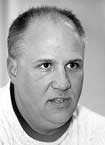 |
 |
|||||
 |
 |
 |
 |
 |
|||||||||||
 |
 |
 |
|||||||||
| David Robinson: “I think we’re called as Christians to fight back in a way that is effective and that holds on to our Christian values. Lashing out is not fighting back. Catholic New World photos/ David V. Kamba
Fighting for ‘peace of Christ’ in a time of war
David Robinson assumed leadership of Pax Christi USA on Aug. 6, 2001, a day he spent in the Anderson County Jail, arrested for protesting at the Oak Ridge National Laboratory on the anniversary of the bombing of Hiroshima. A little more than a month later, members of the Catholic peace organization joined the rest of the world in shock and grief at the terrorist attacks on the World Trade Center and the Pentagon. Robinson, of Erie, Pa., recently visited Chicago to work on the organization’s anti-racism project, and took time to discuss the challenges of pacifism in the last eight months. The Catholic New World: How do you advocate peace in a time when most of the country is advocating war? David Robinson: With more difficulty than usual. We all—we in Pax Christi, we in the peace movement, we, just everybody in the country—were all traumatized and shocked by what happened in September. But even when we were just coming to grips with the horrendous human loss and the potential human loss, I was also gripped with the notion that the challenge before us was going to be greater than we’d ever faced as far as articulating and exploring non-violence as a call of the Christian faith, but also at the same time, the absolute necessity for it. If there weren’t a Pax Christi existing right now, we’d have to invent it. At no time has the peace witness been more important, I think. I disagree with folks who articulated that the peace movement is irrelevant in times of war. I think it’s in those very times that we’re most relevant. TCNW: How has Pax Christi responded to the events of 9/11 and the subsequent bombing and war in Afghanistan? DR: Our first duty is to our members, and that role is dual: we have to be the voice of our members, and we need to be a resource for our members. So the very first thing we began to do was to sort through the different aspects of what had just happened, and find some analysis and some very practical, concrete action suggestions and put those out to our members just as quickly as we possibly could. We work off of a prayer, study and action model, so we were putting things out there for our members’ spiritual nourishment, and to help them get their hands around this issue—everything from where’s Afghanistan and what’s the Afghan story to this point, as well as Islam and political Islam, and what has U.S. foreign policy been toward both Afghanistan and Islam, and then looking at concrete things such as how do we as Catholic peacemakers respond in this moment right now? In those very first days and weeks, that call was clear: it was to be in solidarity with Arab Americans and those who were going to be singled out for retribution. At the same time, initially, we called for restraint. Then as the response began to form up primarily as a military response, we tried to raise a voice against it. We had real concerns about what the long-term and mid-term effects would be of a bombing campaign on Afghanistan, for instance. It seemed to us that with every bomb we dropped we were simply sowing the seeds of new terror down the road. TCNW: What do you say to people who say that we need to fight back or we make ourselves a target for more terrorism? DR: Fight back. We’re all about active non-violence. That’s what we espouse. But how do you fight back? I think we’re called as Christians to fight back in a way that is effective and that holds on to our Christian values. Lashing out is not fighting back. It might feel good to run a massive bombing campaign, but if that bombing campaign has little chance of accomplishing the goal that you set for yourself, then you’re really not doing anything. So the kinds of things that we were very supportive of were, one, developing immediately the unprecedented level of international cooperation that it would take to ferret out finance systems and, through intelligence sharing and that sort of thing, to have an impact on these terror networks. For so long, and particularly this administration prior to Sept. 11, [the United States] was practicing a really arrogant, unilateral foreign policy. And then to stand up there and say, “The world needs to come together”—and we had a moment when the entire world was sympathetic to us, which is hard to pull off. We missed an opportunity. Instead of truly entering into partnership with other nations, whether it be our allies in Europe or our other allies in other parts of the world or developing the relationships that we needed with Islamic countries in different regions, I think we slipped right back into unilateralism. TCNW: Have you read the reports that we’ve already killed between 3,000 and 4,000 civilians in Afghanistan? DR: Absolutely. Marc Herold from the University of New Hampshire did a very conservative study, which is linked to our Web site (www.paxchristiusa.org). He did a very exhaustive study of the foreign press for the most part, as well as Pentagon briefings. A couple here, a couple there, a couple here, pretty soon it starts to add up. I think the point is that the level of civilian casualties for this bombing campaign clearly violates both discrimination in the just war theory and proportionality as far as the response. It raises the sincerest questions in our mind about whether the just-war principles really are useful in critiquing modern war. In essence, the military has a set of formulas they use, like cost-benefit analysis. They know that at a certain height, their bombing would be 100 percent accurate, but they would place themselves at a 75 percent or 80 percent risk of being shot down. If you go a little higher, your accuracy drops, but your risk level lowers. We need to look at that and say that by choosing that tactic, it’s a calculus of killing. Your risk level is very low precisely because the risk level of innocent civilians around the area you are trying to strike is exceedingly high. There’s a line there that has been crossed, and that tactic is immoral in itself under just-war principles, and it does amount to intentionally targeting civilians. TCNW: Have you found people who aren’t necessarily part of the peace movement to be receptive to your message? DR: This particular argument is one that we’ve only been developing over the last couple of months, because we started to have the data. Our general concerns about the war from the beginning, some resonate very much with people outside the traditional circles of the peace movement. For instance, we spent a lot of time trying to get a commitment from people in the Bush administration not to use cluster bombs. Cluster bombs break down into 75-80 little bomblets; they are the same color as the ready-made meals that they were dropping from planes. What we’ve been hearing from Catholic Relief Services people on the ground in Afghanistan is that kids are picking these things up, as they do in every other conflict, and they’re getting their arms blown off or worse, because they think these things are toys or they think they’re meals. That’s just hideous, absolutely hideous. The fact that the U.S. military would drop things that look so similar and are of the same size and painted roughly the same color, one being a deadly bomblet and the other being a life-giving meal, is bizarre, at least. TCNW: How would the perception change if more U.S. soldiers were being killed? DR: Then you get into a political question, because the moral questions, at least from a Catholic perspective, are very bound by Catholic social teaching. The lesson we’ve learned particularly from Vietnam is that if you want to conduct a war, you don’t want casualties. The more casualties you have, the less support for the war. The less support for the war, the more likelihood you’re going to run into more political problems internally down the road. When you connect the dots and look at the wide range of legislation that the Republicans and Republican leadership and George Bush have tried to push through Congress under the banner of 9/11, ranging from tax cuts to fast-track legislation for the free-trade zone of the Americas, we call that policy profiteering. If the level of casualties started to rise, those approval ratings that they’re taking to the bank in Washington would drop faster than a stone. I don’t think that it’s a moral question, I think it’s a political question, and I think it’s some rather cynical politics that are being played out in the dismembered bodies and lost limbs of kids in Afghanistan. For information on Pax Christi in Chicago, call Tom Webb at (773) 752-0672 or e-mail [email protected]
Front Page | Digest | Cardinal | Interview |
|||||||||||